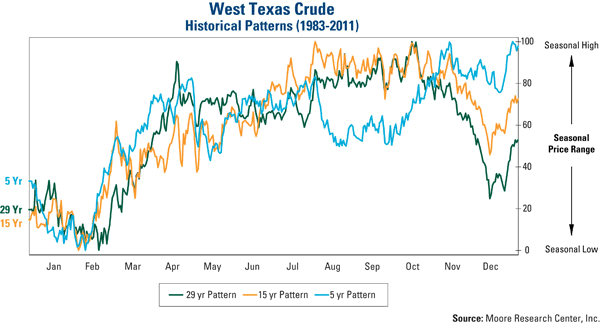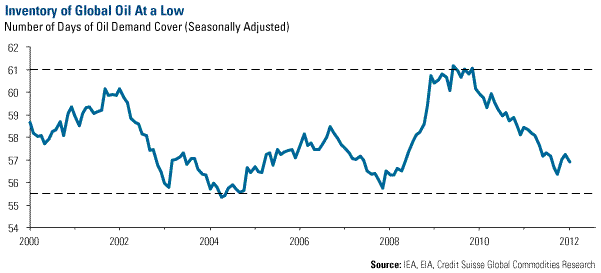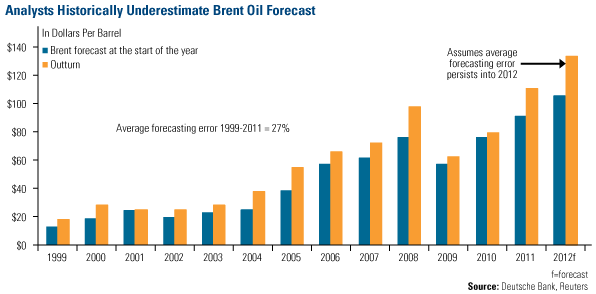Will Crude Oil Price Continue Heading Higher?
Commodities / Crude Oil Mar 06, 2012 - 03:09 AM GMTBy: Frank_Holmes

 Does it feel like it costs an arm and a leg to fill your car these days? While consumers may continue to feel the bite from higher gasoline prices, investors can use these rising prices to their advantage.
Does it feel like it costs an arm and a leg to fill your car these days? While consumers may continue to feel the bite from higher gasoline prices, investors can use these rising prices to their advantage.
Beginning in March, crude oil has a seasonal wind at its back. For nearly 30 years, the third month of the year has been the best month for crude oil. As you can see in the chart below, over the past 5-, 15- and 30-year cycles, West Texas Intermediate crude oil prices head higher in March, and have generally continued to climb through September.

Recently on Yahoo! Finance, Daily Ticker host Aaron Task and I discussed the many factors that should continue to drive oil higher over the next year. While many would like to attribute the rise in oil to the geopolitical developments in Iran, there are more global supply and demand fundamentals to consider. Credit Suisse points to the world’s dwindling inventories of oil as an example. Currently, the number of days of oil demand cover is at a low of about 57, the same level we saw in 2004 and late 2007. This low supply to cover demand means that any disruption in supply will likely drive prices higher.

We expect inventories to be further depleted, as demand continues, especially from emerging markets. Inventories for February and March should show a further reduction, as “oil demand growth was building positive momentum in the fourth quarter in all our regions except Europe,” says Credit Suisse.
According to Bloomberg News, China plans on stockpiling more oil to reduce its local price fluctuations. Countries such as the U.S. generally store emergency oil to ensure their residents, businesses and manufacturers have plenty of stock at a price that’s not too high. As part of a three-phase program to increase its strategic petroleum reserves, China is building four emergency oil-storage facilities across western China, in the east and in the south. By the end of this year, its oil facilities are “expected to bring national crude-storage capacity to 270 million barrels” when construction is complete, says Bloomberg.
By comparison, the U.S. currently has the largest emergency petroleum supply in the world, stockpiling about 570 million barrels of crude oil at four sites located along the Gulf of Mexico.
China is not the only emerging market expected to consume more oil. When I was in Bogata, Colombia a few weeks ago, I saw gas stations posting prices around $5 a gallon. And its citizens can only fill up their gas tanks a few times a week. Yet the economy is booming and the streets are jammed with cars. There’s still tremendous demand in this country, as well as many other growing emerging markets, even with higher gasoline prices.
One question I’m asked when oil jumps in price is, will it hurt the U.S. economy? I don’t believe so. Many analysts believe the economy is in a better position to adjust to higher prices, especially when you compare last year’s oil spike to this year’s.
In 2011, fuel prices rose more than 50 percent in a matter of only a few months, says BCA Research. This “very quick and forceful advance” occurred at the same time that U.S. consumers were driving more miles, the number of unemployed workers was at a high, and job creation was nonexistent, says BCA.
This year, the rise in fuel costs has been more gradual, says BCA. What’s more important to BCA is that “consumers are in better shape than they were last year,” with job creation, unemployment, and income expectations all posting improved numbers. In addition, the U.S. has experienced an unseasonably mild winter, giving furnaces a welcome respite and their owners lower heating bills, making the higher payment at the pumps a little more palatable.
In addition, central banks around the world are in “full-on expansion mode,” says BCA. This needed liquidity and support for growth provides an injection of confidence directly into the global consumers’ veins.
Beware of biases by oil analysts: Deutsche Bank research going back to 1999 found that analysts “consistently underestimate” the Brent oil price by an average of 27 percent. The chart below shows the forecasted price made by analysts compared to the actual Brent oil price outturn. Every year, analysts have underestimated how strong Brent will be, ranging from as little as 2 percent to as high as 54 percent. Using the average forecasting error, Brent could be as high as $135 a barrel.

We expect there to be corrections in the price of oil throughout 2012, just like the ups and downs commodities experience from year to year. While the world is hungry for energy, there’s no free lunch on the Periodic Table of Commodities, and historically, from year to year, commodities fluctuate. Crude oil, for example, has seen its share of ups and downs: In 2008, oil lost 53 percent; in 2009, it increased a substantial 78 percent.
On our interactive version of the Periodic Table of Commodity Returns, you can see this for yourself. Click on a particular commodity and see how it has performed each year over the past 10 years. See the interactive table.
While oil may remain elevated, use these higher prices to your advantage by owning natural resources companies or funds such as the Global Resources Fund (PSPFX) that potentially benefit from higher prices. This gives investors a way to potentially offset those higher gasoline bills.
U.S. Global Investors, Inc. is an investment management firm specializing in gold, natural resources, emerging markets and global infrastructure opportunities around the world. The company, headquartered in San Antonio, Texas, manages 13 no-load mutual funds in the U.S. Global Investors fund family, as well as funds for international clients.
For more updates on global investing from Frank and the rest of the U.S. Global Investors team, follow us on Twitter at www.twitter.com/USFunds or like us on Facebook at www.facebook.com/USFunds. You can also watch exclusive videos on what our research overseas has turned up on our YouTube channel at www.youtube.com/USFunds.
By Frank Holmes
CEO and Chief Investment Officer
U.S. Global Investors
U.S. Global Investors, Inc. is an investment management firm specializing in gold, natural resources, emerging markets and global infrastructure opportunities around the world. The company, headquartered in San Antonio, Texas, manages 13 no-load mutual funds in the U.S. Global Investors fund family, as well as funds for international clients.
All opinions expressed and data provided are subject to change without notice. Some of these opinions may not be appropriate to every investor.
Standard deviation is a measure of the dispersion of a set of data from its mean. The more spread apart the data, the higher the deviation. Standard deviation is also known as historical volatility. All opinions expressed and data provided are subject to change without notice. Some of these opinions may not be appropriate to every investor. The S&P 500 Stock Index is a widely recognized capitalization-weighted index of 500 common stock prices in U.S. companies. The NYSE Arca Gold BUGS (Basket of Unhedged Gold Stocks) Index (HUI) is a modified equal dollar weighted index of companies involved in gold mining. The HUI Index was designed to provide significant exposure to near term movements in gold prices by including companies that do not hedge their gold production beyond 1.5 years. The MSCI Emerging Markets Index is a free float-adjusted market capitalization index that is designed to measure equity market performance in the global emerging markets. The U.S. Trade Weighted Dollar Index provides a general indication of the international value of the U.S. dollar.
Frank Holmes Archive |
© 2005-2022 http://www.MarketOracle.co.uk - The Market Oracle is a FREE Daily Financial Markets Analysis & Forecasting online publication.


